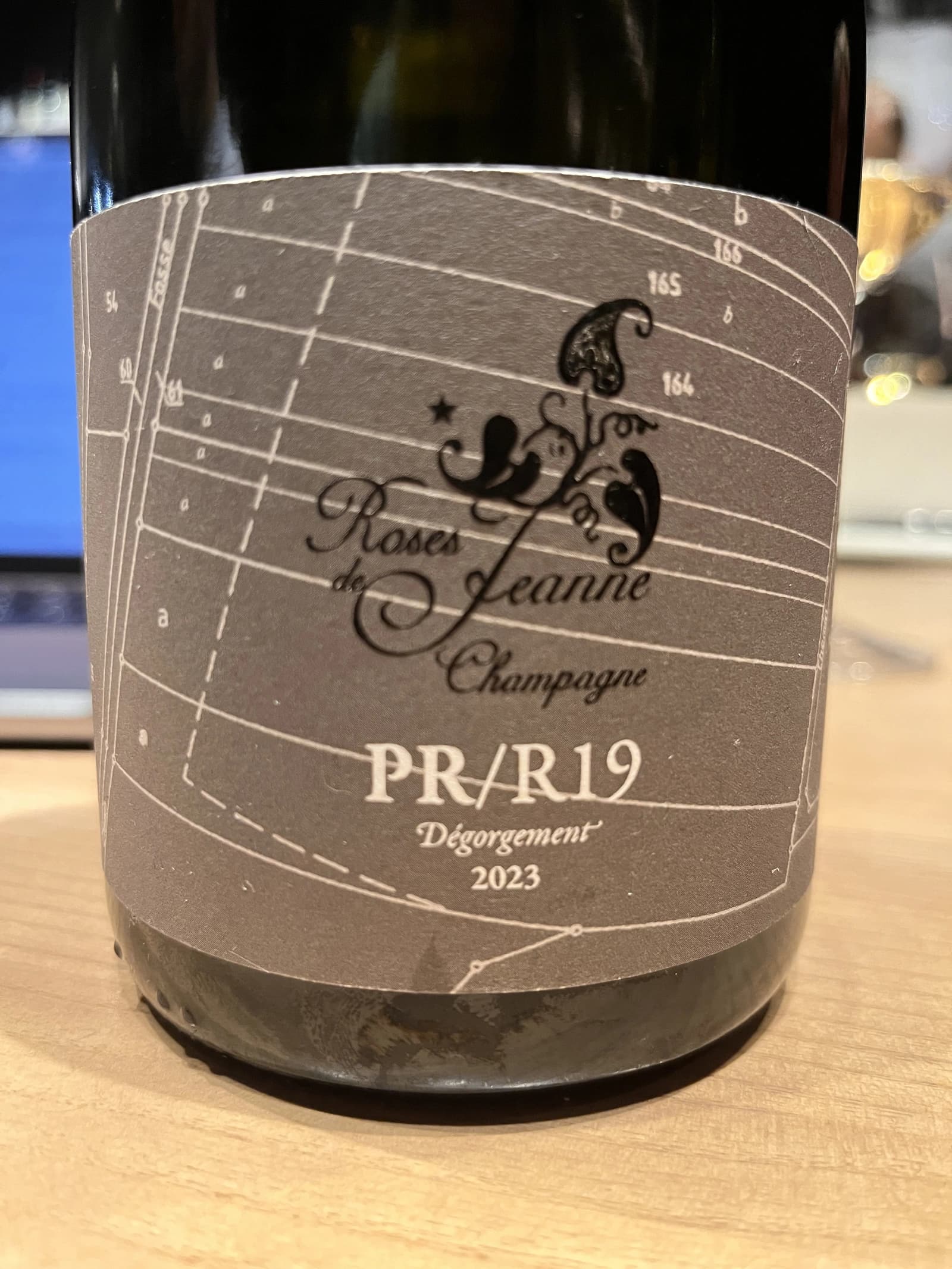Roses De Jeanne Presle PR/R19 2019
- Region
- France » Champagne » Champagne AOC » Côte des Bar
- Type
- white traditional sparkling, brut
- Producer
- Vintage
- 2019
- Disgorged
- 2023
- On lees
- 36 months
- Grapes
- Pinot Noir
- Alcohol
- 12.5
- Sugar
- 1
- Volume
- 750 mL
- Cellar
- not available
- Find at

This wine is derived from a 0.25-hectare vineyard, consisting of 15 rows of co-planted Burgundian Pinot clones, all selected through massale propagation in 2007. The soil is a rich blend of clay and limestone, interspersed with Kimmeridgian bands, akin to those found in Chablis and Chavignol, lending a unique mineral profile. The vineyard is maintained through organic practices. The production involves only the first press of hand-harvested grapes, which are then foot-crushed, ensuring a gentle extraction. Fermentation occurs naturally with indigenous yeasts in stainless steel tanks, preserving the wine's authentic expression. It is then bottled unfined and unfiltered, retaining its natural essence. The wine undergoes a lengthy 36-month aging sur lie, adding complexity without any dosage, to enhance its purity and texture.
Ratings
This wine captivates with a delicate bouquet that's both charming and fruit-forward. Aromas of cider and apple candy, blossoming orchard, with subtle nuances of sunflower oil adding depth. The palate is elegant and round, achieving an almost perfect balance. It’s focused and well-structured, showcasing a complexity that’s impressive for its youth. The finish is long, marked by beautifully integrated oxidative notes reminiscent of bruised apples, complemented by subtle hints of brioche.
About Producer
Roses de Jeanne is the project of Cédric Bouchard, who began bottling under this name in 2000 after a short career as a sommelier in Paris. He returned to his roots in the Côte des Bar, taking over a small plot of his father's vines near Celles-sur-Ource - and instead of following Champagne's traditional playbook, he rewrote it entirely.
No blending. No dosage. No compromise. Just one vineyard, one grape, one vintage - each time.
It might sound like dogma, but it's not. What Bouchard is chasing is clarity. His work in the vineyard is quiet and deliberate - organic farming, radically low yields, an insistence on perfect ripeness. In the cellar, he uses only the first press juice, lets native yeasts take the lead, and relies on a slow, cool second fermentation to shape the texture. Everything is done to preserve detail and nuance.
The wines aren't filtered through Champagne's usual layers of reserve wines and house style. They come straight from the place, vintage, and Bouchard's exacting vision.
He started small - just 1.37 hectares - and many of the wines remain painfully limited. But each cuvée is a distinct and articulate expression of its origin:
- Val Vilaine – 100% Pinot Noir from the lieu-dit of Val Vilaine. Often the most approachable in the range, though no less serious. 300–500 cases.
- Les Ursules – Also Pinot Noir, from a south-facing site on Kimmeridgian limestone. More structured, more brooding. First released in 2014.
- Côte de Bachelin [La Parcelle] – Single parcel Pinot Noir, aged three years on lees. Around 150 cases annually.
- Haute-Lemblée – Chardonnay from a chalky plot. Rare, mineral, hauntingly pure.
- Bolorée – Pinot Blanc. Yes, Pinot Blanc. From a site called La Bolorée. Textured and oddly timeless.
- Creux d'Enfer Rosé – Saignée rosé of Pinot Noir. The rarest wine in the cellar. Almost mythological in its scarcity.
These aren't showy wines. They don't sparkle conventionally. Instead, they hum with energy - tense, soil-driven, sometimes austere, always precise. They're not for everyone, and that's fine.
Bouchard himself suggests decanting them gently. I'd add - give them time, give them silence, and they'll tell you where they come from.